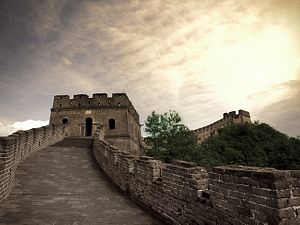As speculation mounts about which “tweetable gifts” China’s President Xi Jinping is bringing to the Mar-a-Lago summit on Thursday, the prize so far goes to a proposal for China to build Trump’s big, beautiful wall along the U.S. border with Mexico. Xi would offer to do this as a sign of respect for America’s new president, at no cost to U.S. taxpayers, and to complete the project within a year.
The Chinese team preparing for the summit noted with concern that when President Donald Trump met German Chancellor Angela Merkel in March, he reportedly gave her a bill for $376 billion to compensate for Germany’s shortfall in military spending as a member of NATO. If Trump’s China team, which includes Steve Bannon and Peter Navarro, were to make an analogous estimate of what China owes the United States for a decade of bilateral trade deficits, it would certainly amount to many multiples of Merkel’s bill.
According to Chinese traditions, China’s emperors (and their modern day analogues) give signature gifts to leaders of nations that show China respect. As a recent visitor to Djibouti reported, President Ismaïl Omar Guelleh is fond of bragging that his splendid new palace and huge modern soccer stadium in the capital were presents from China. Southeast Asian leaders are also accustomed to China’s practice of handing out major grants, loans, and contracts in the run up to Association of Southeast Asian Nations (ASEAN) Summit meetings to encourage a spirit of cooperation (and compliance).
Indeed, an essential element in the Chinese art of the deal is guanxi. In many cases, this includes direct payments to another leader that in English law tradition would be called bribes. While Saudi Arabia, not China, was the source of the $681 million “gift” to Malaysian Prime Minister Najib Razak in the 1MDB scandal that is now the focus of an international criminal investigation, savvy Asian observers note that while China is more skillful, it is even wealthier than Saudi Arabia.
If he chose to make such an offer to Trump, Xi might explain his choice by underlining three key points. First, Chinese believe in walls. Unlike the legions of critics both at home and abroad who ridicule walls, Chinese see secure borders as an essential feature of any competent state.
Second, he might remind Trump that the Chinese have some experience with walls. The first emperor of China began building a wall along China’s northern border in the third century BC. While not completed until the 17th century, what we now know as the Great Wall of China stretches 5,500 miles along China’s historic northern border. Initially constructed to prevent invaders from the steppes and unwanted immigrants, it has also served to prevent smuggling and control trade.
Third, Xi could also point out that since earlier centuries in which construction of walls took decades, or even centuries, China has made significant advances in construction. Currently the Trump administration is soliciting bids for a wall along the border with Mexico that the Department of Homeland Security has estimated will cost more than $21 billion and take more than three years to complete. Based on America’s past experience in wall-building, both of these numbers are wildly optimistic.
An offer by China to show the United States how such infrastructure projects could be accelerated and their costs lowered would be welcome by many Americans frustrated by slow-mo reconstruction of our bridges, highways, tunnels, and airports. Over the past four years, I have seen this up close and personally in the refurbishing of the bridge across the Charles River that connects the Harvard Business School and the Harvard Kennedy School. When it is finally completed later this fall, the project will have taken more than 48 months and its costs will have tripled all along the way. Contrast this with China’s reconstruction of a bridge twice the size of the one over the Charles last year. As one can see on YouTube, this was completed in 43 hours.
To make the idea more palatable, Xi might also propose that some of the construction be done jointly so that China could introduce to the United States some of its more advanced construction techniques. He could even express China’s readiness to engage in joint ventures both in financing and implementing Trump’s proposed $1 trillion infrastructure initiative.
Will Xi make such an offer? At this point, no one knows. But if he were to do so, it would surely be the headline tweet from the summit.
Graham Allison is the director of Harvard Kennedy School’s Belfer Center for Science and International Affairs and the author of the forthcoming book, Destined for War: Can America and China Escape Thucydides’s Trap?

































